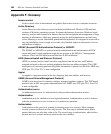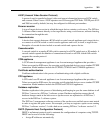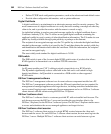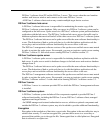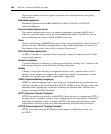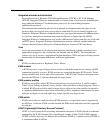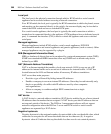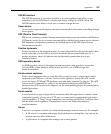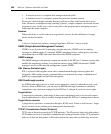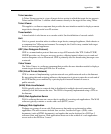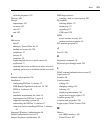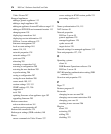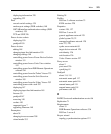
368 DSView 3 Software Installer/User Guide
• A network server is a computer that manages network traffic.
• A database server is a computer system that processes database queries.
Servers are often dedicated, meaning that they perform no other tasks besides their server
tasks. However, on multiprocessing operating systems, a single computer can execute several
programs at once. In this case, a server may refer to the program that is managing resources
rather than the entire computer.
Session
When used alone, a session refers to a target device session. See the definition of a target
device session for details.
Site
A site is a location that contains a managed appliance, DSView 3 server or both.
SNMP (Simple Network Management Protocol)
SNMP is a set of protocols for managing complex networks. SNMP works by sending
messages to different parts of a network. SNMP-compliant devices, called agents, store data
about themselves in MIBs and return this data to the SNMP requesters.
SNMP manager
The SNMP manager is an optional component (outside of the DSView 3 software system) that
enables the monitoring of many cross-platform devices using SNMP information. SNMP
managers are also called network management systems (NMS).
SSL (Secure Sockets Layer)
SSL is a protocol that supplies secure data communication through data encryption and
decryption. SSL enables private communications over networks by using a combination of
public key cryptography and bulk data encryption.
SSH Passthrough session
An SSH Passthrough session is a serial session opened to a unit by without the use of a web
browser. From an SSH client, you can enter an SSH Passthrough command to establish a
connection to any serial unit managed by the DSView 3 software if you have access rights.
Target device
A target device includes a wide range of data center components such as servers and routers
that an administrator is able to virtually manage through the DSView 3 management software.
Target device session
A target device session is a connection through a KVM, serial, Telnet or web browser. Target
device sessions do not include power management functionality.
TCP/IP (Transmission Control Protocol)
TCP is one of the main protocols in TCP/IP networks. The IP protocol deals only with packets.
TCP enables two hosts to establish a connection and exchange streams of data. TCP guarantees
delivery of data and that packets will be delivered in the same order in which they were sent.



